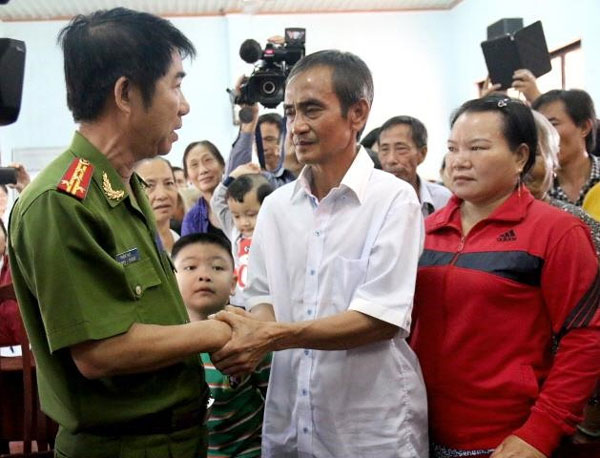|
State asked to apologise to wrongfully convicted
The State needs
to take responsibility and apologise to people who were wrongfully sentenced,
National Assembly deputies said yesterday.
At a session to discuss the draft amended Law on
State’s responsibility on Compensation, Nguyen Khac Dinh, vice chairman of
the NA Law Committee, presented the report of the NA Standing Committee on
amending the draft law.
Dinh said there some believe the State needs to
compensate and apologise to those who are wrongfully convicted, but the
Standing Committee thought differently.
“The right to protect one’s reputation includes the
right to deny information that does harm to their reputation and the right to
ask for a public apology and compensation. But if the Law requires the State
to apologise without a request, this take the matter out of the hands of the
wrongfully convicted,” Dinh said.
He added that the Standing Committee asked the drafters
of the law to add a requirement for the agency in charge of compensating the
wrongfully convicted to clarify if they want a public apology.
Deputy Nguyen Thi Thuy from Bac Kan, said that the
apologies must be compulsory.
“It’s not a matter of someone’s reputation being
damaged by information, but being damaged by an agency. So protecting the
pride of the wrongfully convicted must be the responsibility of the State and
not a simple civic matter,” Thuy said.
Deputy Luu Binh Nhuong from Ben Tre Province, agreed,
saying that a “request for an apology was not necessary”.
“We’re building a State that works for the people, we
have to be fair with the people. We can’t do something right only when
the people ask for it,” he said.
Regarding compensation for families of the wrongfully
convicted who have died, deputies agreed that compensation should only be
given to the closest heir/next of kin.
“This is feasible and rational – we can’t compensate
every relative of the wrongfully convicted if they die, it would be very
complicated,” deputy Dao Tu Hoa from Ha Noi said.
However, deputy Bui Van Xuyen from Thai Binh Province,
said the amount stipulated in the draft amended law was too high. The draft
law stipulated that compensation to the closest heirs/next of kin of the
wrongfully convicted die is equal to 360 months of basic salary. Xuyen asked
for an explanation as to why this rate was chosen.
On compensation rate, many deputies said the specific
calculation of the compensation should be included in the Law, because
current regulations do not mention it specifically.
Vietnamese and foreign individuals and organisations
lawfully in Viet Nam that suffer material or mental sufferings caused by the
State are entitled to compensation under the Law on State Compensation
Liability.
According to a Justice Ministry report, the law
contains legal provisions on compensation for damage caused by the State,
putting an end to the current parallel existence of two legal mechanisms on
damage compensation in administrative management and criminal proceedings.
The law provides for state compensation liability in
administrative management, legal proceedings and judgment enforcement.
Draft Programme for building laws,
ordinaces in 2018
Discussing about the programme on building laws, many
deputies agreed it that has made positive changes. Documents on
implementation had become more relevant. However, the implementation of the
programme still had shortcomings. The quality of preparation for some
projects is still lacking.
On the same day, deputies discussed the draft programme
for building laws, ordinances in 2018 and the draft programme on supervision
activities of the National Assembly in 2018. Deputies agreed that from 2018
onwards, no more than three projects will be assigned to a drafting agency or
appraisal body, except in special cases.
They also agree to reduce the number of projects
included in the programme of the year-end session to devote time to the
National Assembly to consider socio-economic and state budget contents and
amendments and additions to new laws that are promulgated or recently
enforced.
Projects that are not up snuff or fail to submit
records in time should be withdrawn from the programme or drafters should
request a delay in submission to continue their preparation.
VNS
|
Thứ Năm, 1 tháng 6, 2017
Đăng ký:
Đăng Nhận xét (Atom)

Không có nhận xét nào:
Đăng nhận xét